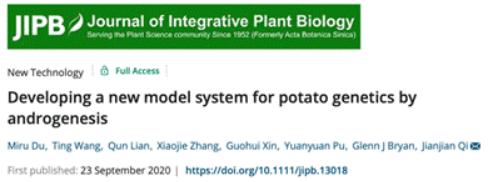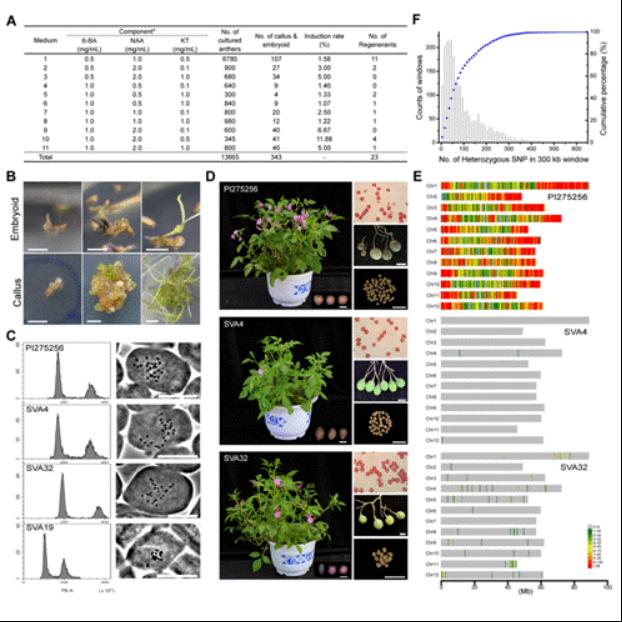Recently the project team headed by Prof. Qi Jianjian from Inner Mongolia Potato Engineering & Technology Research Center of IMU made a significant breakthrough in the innovation of breed quality of potatoes and published their corresponding findings in Journal of Integrative Plant Biology (Category Q1 of Chinese Academy of Sciences), a prestigious international journal of botany with the title Developing a New Model System for Potato Genetics by Androgenesis (https://onlinelibrary.wiley.com/doi/abs/10.1111/jipb.13018), of which IMU is the organization of the first author and the corresponding author, Du Miru, lecturer of Inner Mongolia Potato Engineering & Technology Research Center of IMU and her team and Wang Ting, a postgraduate from IMU are first authors, and Prof. Qi Jianjian is the corresponding author.

A major crop in China consumed both as a vegetable and as staple food, potato is one of the distinctive crops in Inner Mongolia with unique advantages. The potato breeds widely planted are tetraploids characterized by high heterozygosity of genomes, extremely complicated genetic segregation and serious inbreeding depression. Lack of appropriate model research materials is the major problem in the genetic positioning of functional genes and segregated cloning at the moment.
Solanum verrucosum, a breed of potato of diploid heterozygosity, is used as the donor in the research to produce 23 pieces of regenerated materials through cultivation of microspore induction. Six pieces of diploid regenerated plants was discovered through identifications with calculation of root tip chromosome, flow cytometric method and other methods. Analysis of organism polymorphism marking indicates that the theoretical homozygosity of the six diploids approximate 100%. The team conducted a two-year phenotype appraisal (including observation of plant appearance, self compatibility, setting rate and yields, etc) of the above-mentioned diploids and eventually succeeded in selecting two well-performing diploids, SVA4 and SVA32. Re-sequencing of the whole genomes further certify that SVA4 and SVA32 are diploids with 100% homozygosity. In addition, identification method for homozygosity of regenerated plant materials based on re-sequencing data was developed in the research, which can increase the number of genetic locus for testing by more than 1000 times and can be used in the homozygosity appraisal of the offspring groups of other species.

The SVA4 and SVA32 produced in the research, characterized by plant homozygosity of classic models, possibility of inbreeding and readiness for genetic transformation, enriched the categories of materials in the research of potato genetics. The team is at the moment engaged in the construction of mutant library of potatoes in the hope of providing technical support for the gene exploration and the improvement of molecular breeding of potatoes in China.
A brief introduction to the corresponding author: Professor Qi Jianajian, doctoral supervisor, graduated from Chinese Academy of Agricultural Sciences in 2014 with a doctor’s degree in agronomy. Prof. Qi was introduced into Inner Mongolia Potato Engineering & Technology Research Center of IMU as academic leader in 2015, selected into Grassland Talents Program and Young Talents in Science and Technology of the autonomous region, and is in charge of projects funded by National Natural Science Foundation of China and Outstanding Youths Cultivation Foundation of Inner Mongolia. Prof. Qi has published achievements of research in prestigious international journals including Nature Genetics and JIPB.

